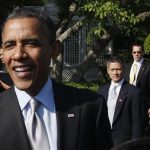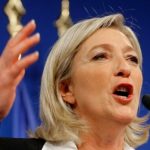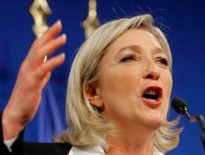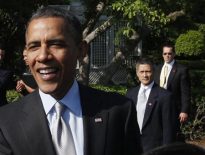PARIS (AP) — Thrice married, Nicolas Sarkozy knows about love that flames up and later fades away.
Now, he faces the battle of his career to avoid a humiliating political divorce from the French people — who were once
infatuated with him.
AP
On Sunday, French voters handed the
conservative president a warning: He narrowly lost to Francois Hollande in the first round of France’s presidential
election. That sets up a far tougher challenge for Sarkozy: Overcoming across-the-board poll predictions that he will lose to
Hollande in their runoff May 6.
Like him or loathe him, Sarkozy has the character of someone who faces up to
challenges. An impulsive, high-energy political brawler, Sarkozy is no stranger to tough times both politically and
personally. Until recently, he seemed to relish a chance to be France’s political comeback kid.
But Friday, in a
radio interview, Sarkozy seemed to sense unfavorable political winds, and acknowledged the biggest “mistake” of his five-year
term was underestimating the solemnity that the French seek in their presidents.
In many ways, France in 2007 took a
gamble on Sarkozy — who himself loves risk-taking — because he doesn’t fit the traditional mold of politicians in France.
And not just for his foreign-sounding surname of Hungarian origin.
Sarkozy, 57, didn’t have the typical educational
or family pedigree of French political elites. He made up for it with passion, intensity and ambition. His biographers have
suggested that Sarkozy, the middle of three brothers in a family with origins in Hungary, had something to prove: To his
father, who divorced his mother when Nicolas was young and drew the son’s scorn; to the upper-middle class clique of his
youth, which at times rejected him because of his uncomfortable family situation and outsider image; and to show France that
an outsider could make it.
After 12 years under fellow conservative President Jacques Chirac, Sarkozy had a case to
make in his campaign to mark a “rupture” with the past. Sarkozy doesn’t mince words and exuded a dynamism that many French
craved for 21st-century challenges.
Such attributes, in the end, may have proved too much for the French. Countless
voters have told pollsters that Sarkozy’s personality and style turned them off. After Sarkozy took office, he stocked his
weekly schedule so full that he gained the nickname of the “omni-president.”
Sarkozy’s first year in power appeared
to hurt his image the most, and he never fully recovered. He and his entourage celebrated his victory at the too-chic
restaurant Fouquet’s on the Champs-Elysees. He trotted up the steps of the presidential palace in jogging shorts after a
run; He toyed with his mobile phone during a papal audience at the Vatican with TV cameras rolling; he divorced his wife,
began dating former supermodel Carla Bruni in a fast, high-profile courtship, and married her months later. In 2008, he
crudely insulted a man at a Paris agricultural fair.
Later in Sarkozy’s tenure, a string of scandals touched on his
entourage and political allies, suggesting his campaign-trial promises of an “exemplary” republic were hollow. Sarkozy has
been politically minded since he was a teen — favoring French pride and independence touted by Gen. Charles de
Gaulle.
After earning degrees in political science and law in the early 1980s, Sarkozy was elected France’s
then-youngest mayor, in the ultra-rich Paris suburb of Neuilly. Nationally, he made his name as a hero negotiator of a
hostage crisis at a Neuilly nursery school.
His political career soared in his role as hard-nosed interior minister in
the 2000s, overseeing a drop in crime and new anti-terrorism legislation. Sarkozy, the first French president to divorce and
remarry in office, is the father of three sons and, as of last year, a daughter with Bruni-Sarkozy.
Politically,
Sarkozy traditionally favors free markets, but has been unafraid to defend French business. He long took pride in his moniker
as “Sarko l’Americain” — and has rebuilt ties both with the U.S. and Israel. He led France into a leadership role in a
NATO-backed revolution in Libya that toppled Moammar Gadhafi, and has taken a tough line on nuclear-minded Iran. Along with
German Chancellor Angela Merkel, he helped craft a hard-won European fiscal treaty meant to stem the continent’s debt
crisis.
As president, Sarkozy said on RTL Radio that he has learned his lessons and will change on matters of style —
if not substance. “Perhaps the mistake I made at the start of my term was not understanding the symbolic dimension of the
president’s role, and not being solemn enough in my action,” he said.
“I remained, at my core, a minister: So when
the fishermen got angry, I would go. When layoffs got announced, I’d go. When a dramatic event would happen, I’d go,” he
said in response to a listener’s question.
“I won’t make that mistake again.” If he loses on May 6, Sarkozy says
he’ll call it quits from politics. “If the French people were not to entrust me with their confidence, do you really think I
should continue my political career?” he mused recently on RMC radio. “The answer is no.”





